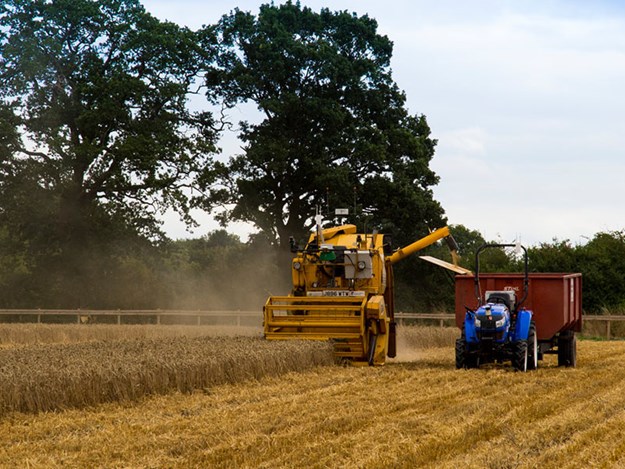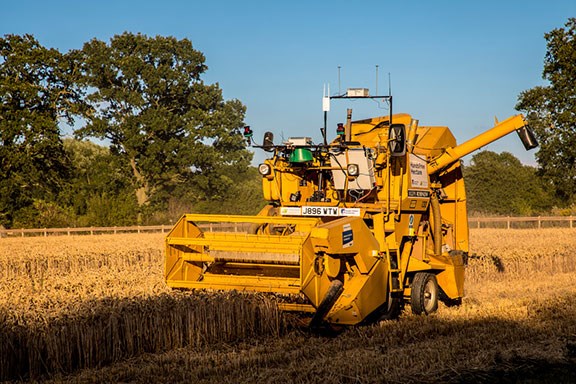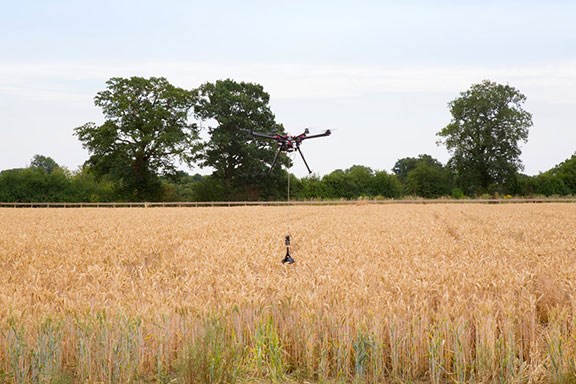An autonomously-run arable farm project in the UK receives a funding boost to expand
 |
|
The Hands Free Farm is already preparing to grow three different grains on 35 hectares thanks to extra funding
|
Extra funding has been made available to a unique autonomous arable farming project in the UK allowing it to expand.
Initially launched in 2016 by Harper Adams University and Precision Decisions, the Hands Free Hectare (HFHa) project was designed to demonstrate that one hectare of grain could be grown to harvest without humans setting foot on the land.
Since then, the group has successfully harvested two seasons of grain by only using robots and autonomous machinery, including a tractor, combine and drones.
Without setting foot in the one hectare field, the group remotely managed to perform all tasks associated with the crop, including preparing the ground, sowing the seeds, maintaining the crop and subsequently the harvest.
With the £200,000 (A$365,000) in government funding the team were able to convert a small Iseki tractor and a 25 year old combine harvester with a two metre header into autonomous robots with cameras, lasers and GPS systems.
As no one was allowed to step in the field, drones were used to scoop up soil samples and take crop samples for testing as well as monitoring the crop for weeds and disease.
Riding on that initial success the team at Hands Free Hectare have been awarded extra funding to expand their operations to a full farm of 35 hectares.
 |
| We’re moving away from the perfect hectare and to real world situations |
The new Hands Free Farm will be a three-year-long project, run in partnership once again between Harper Adams and Precision Decisions, along with a new partner, the UK division of Australian precision agriculture specialist Farmscan AG.
The project is already underway at the university’s campus in Shropshire where the Agricultural Engineering Precision Innovation Centre (Agri-Epi Centre) is providing the team with development space and project management support at their Midlands Agri-Tech Innovation Hub, which is also located on the university’s campus.
University mechatronics researcher Jonathan Gill says: “This time, we’re planning to grow three different combinable crops across 35 hectares. We’re moving past the feasibility study which the hectare provided us with, to now a vision of the future of farming.
“We want to prove the capability and ability of these systems in reducing the levels of soil compaction and precision application,” he says.
Precision Decisions engineer Martin Abell says: “With the farm, we’re looking to solve problems like fleet management and swarm vehicle logistics and navigation.
“We still believe that smaller vehicles are best, so we’ll be using up to three small tractors for the project, including our original Iseki tractor, and a Claas combine will be joining our old Sampo.
“This time, we’re moving away from the perfect hectare and to real world situations. The fields will be irregular, there’ll be obstacles, undulating land and pathways,” he adds.
The goal of the new larger farm is to become a ‘testbed’ for agricultural innovation where companies can visit to try out their new innovations.
Senior agricultural engineering lecturer at the university Kit Franklin said: “We want the farm to become a testbed for agricultural innovation. Once the farm’s established, we’ll be encouraging companies to come and test and evaluate their technologies.
 |
“It’s also great that the project will remain on the university campus, so that students will be able to learn from it, watch our progress and see how dynamic and innovative the agricultural engineering industry is.”
Farmscan AG’s Callum Chalmers adds: “We’re hoping to expand on the great foundations the HFHa laid by integrating our existing industry proven technology with a developing autonomous platform to provide precision control across the farm.
“Our goal is to have multiple small unmanned vehicles working together seamlessly in the same fields, all remotely monitored and completing all the tasks you would expect in a commercial farm.
“Navigating roads and pathways between fields is an exciting new challenge; we want to face real world conditions, where fields aren’t often in one place and it’s a necessity to travel between them,” he says.

